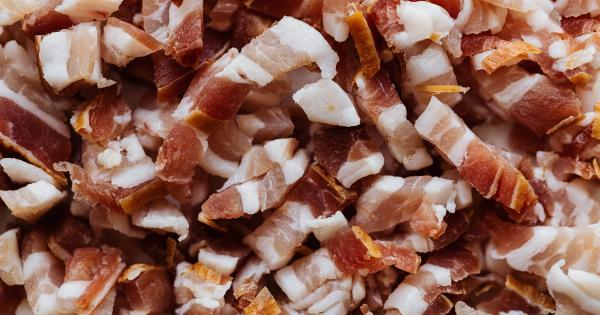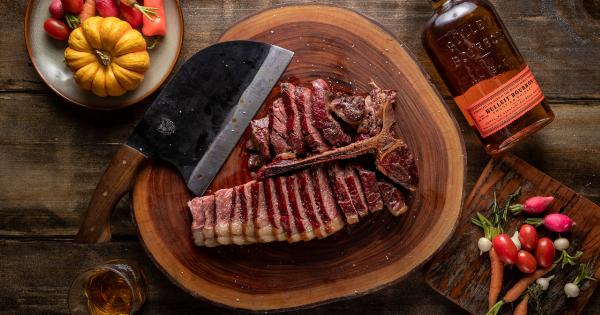Meat is a ubiquitous food in most parts of the world. It is a rich source of protein, essential amino acids, minerals, and vitamins that provide the body with numerous health benefits.
On the other hand, meat consumption, especially red meat, has been linked to several chronic illnesses such as cancer, heart diseases, and type 2 diabetes. Despite these health risks, men generally consume more meat than women, and this phenomenon begs the question, why is meat consumption higher among men? This article delves into the possible reasons behind this trend.
Socio-cultural Factors
Socio-cultural factors such as gender roles, traditions, and social norms play a significant role in shaping our eating habits.
In most cultures, men are expected to consume more protein than women to support their physical activities and muscular development. Meat has been a symbol of masculinity for so long that many men associate it with their strength and ability to provide for their families.
As a result, men tend to consume more meat to prove their manhood and fulfill their traditional gender role obligations.
Marketing Strategies
Marketing strategies also contribute significantly to meat consumption among men. Meat is often marketed as a food that men should eat to be strong and healthy.
The advertising industry has made significant strides in making meat an important part of men’s identity. Advertisements that promote meat consumption portray meat as something that every man should aspire to eat. This kind of marketing creates a cultural narrative that connects meat consumption to masculine identity further.
Food Deserts
Food deserts are areas where it is difficult to access healthy and nutritious food, usually found in low-income neighborhoods.
These areas lack grocery stores and other healthy food providers, making it impossible for people to access freshly prepared meals and affordable fresh vegetables and fruits. As a result, people living in food deserts tend to rely on cheap and unhealthy fast food outlets, among which meat consumption is very high.
Unfortunately, low-income families are usually headed by single mothers, making men the primary consumers of meat in these neighborhoods.
Physical Demand
Men typically have higher energy requirements than women due to their larger body size and high energy expenditure related to their physical activities.
Athletes and manual laborers need high protein to support muscle growth and repair, making meat a crucial source of fuel. As a result, men tend to consume more meat to meet their nutritional needs. Men need to consume more protein than women to enjoy optimal health throughout their lives.
Therefore, higher meat consumption among men is an essential aspect of fulfilling their nutritional needs.
Peer Group Influence
Peer groups have a significant impact on our eating habits. Men that spend most of their time with other men who consume lots of meat tend to eat more meat than those who do not belong to such groups.
Men’s affinity for meat is often characteristic among groups of like-minded individuals, such as bodybuilders, hunters, and sports fanatics. Unfortunately, such groups of men may engage in unhealthy meat-eating habits that eventually impact their health negatively over time.
Cost Effectiveness
Meat is often considered a luxury because it’s more expensive than other food groups such as fruits and vegetables. However, processed meat products such as hot dogs, bacon, and sausages are relatively cheap and readily available.
Red meat may be expensive, but cheaper cuts like ground beef are affordable. Men that want to consume more protein but don’t have disposable income to fund their habit tend to opt for these cheaper cuts of meat. Therefore, the cost-effectiveness of meat is another reason why men tend to consume it more than women.
Stress Relief
Studies have shown that men tend to eat more during stressful times than women. When men experience stress, their bodies produce higher amounts of cortisol, the stress hormone that triggers cravings and causes overeating.
As a result, men often consume more meat when they are stressed as a way to cope with their emotions. The act of eating meat becomes a stress-relieving mechanism that men tend to engage in, leading to higher meat consumption among men.
Flavors and Taste
Meat has a unique flavor that most people tend to enjoy. Men, in particular, are attracted to the barbeque flavors and the smoky taste of meat.
The satisfaction derived from eating meat is often attributed to the flavors derived from cooking meat on a grill or smoker, and men tend to enjoy this experience more than women. Therefore, meat consumption among men is driven by the unique taste flavors associated with meat preparation.
Tradition and Culture
Meat consumption has a long history and tradition, and it is deeply rooted in most cultures around the world. In many cultures and beliefs, traditional feasts and rituals are often marked by the slaughtering and consumption of animals.
Therefore, men tend to consume more meat to preserve their cultural heritage and identity. Meat consumption has also been associated with celebrations such as weddings and other social gatherings where food is used as a sign of hospitality.
The tradition and culture of meat consumption have contributed to the higher consumption of meat among men.
Nutritional Misconceptions
It is often claimed that men need a higher amount of protein than women to maintain muscle mass, which is partly true. However, this nutritional misconception has been used to justify high meat consumption among men.
In reality, a lot of protein can be found in plant-based foods such as beans, lentils, and tofu. These foods may not have all the essential amino acids present in meat, but they provide enough nutritional value to promote optimal health.
It is therefore critical to educate men on the nutritional value of plant-based foods and debunk the myth that meat is the only source of protein.































